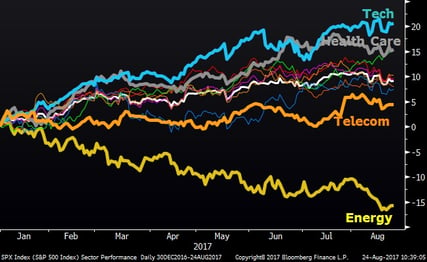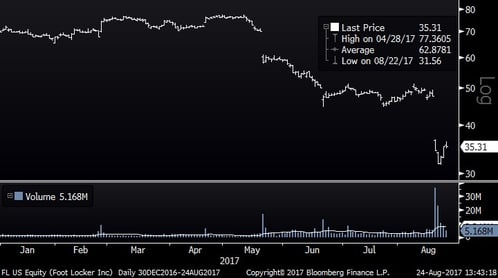Energy Stock Divergence
The energy sector has been weak all year, and is now down about 17% year-to-date. As one would expect, energy stocks generally move with the underlying price in oil. Recently, this relationship has diverged. Since June, oil has recovered from $42 to $48 a barrel. Meanwhile, energy stocks have continued to fall to new lows. To me, this reflects a somewhat bearish sentiment in these stocks as investors have given up on them and pursued other opportunities. The lower prices have, of course, driven up dividend yields. Exxon Mobil, for example, is now paying a 4% dividend yield, which is at the high end of its 20-year range. Divergences like this usually correct themselves, so it will be interesting to see how this plays out. WATCH: Time To Buy Energy Stocks?
Oil Prices and Energy Stocks (Year-to-Date)

Performance by Sector (YTD)

Internal Market Weakness
The S&P 500 is still up about 9% this year. This is not reflective, however, of many other groups of stocks. Beyond the weakness in energy noted above, the Russell 2000 index is only about flat this year. Additionally, dividend paying stocks are only up about half of the S&P 500. This suggests that portfolios invested in dividend-paying or small-cap stocks are not likely to be performing as well as the S&P 500 this year. MORE: Puny Gains For Small Stocks
Index Performance (YTD)

The Dow is not the Market
The commentary above reminds me of a chart I saw from the New York Times last week. People often assume that stock market indices reflect the market as a whole – this is frequently not the case. This year, for example, 25% of the gain in the Dow Jones Industrial Average has come from Boeing. Stocks like Boeing and Goldman Sachs consist of 7 percent of the 30-stock index, while others like Cisco and GE consist of less than one percent. This is very different than how most people would construct a portfolio. READ: Why The Dow Isn't Really The Stock Market

Another one Bites the Dust
Every week there seems to a new victim of Amazon and/or the rapidly changing behavior of consumers. Last week, a victim was Foot Locker. Apparently, people are not going to the mall to buy shoes anymore…who would have guessed? Apparently not the market, since the stock dropped 30% last week and was near all-time highs as recently as May. There is talk of bottom-fishing in the retail rubble, but so far most of those fish have turned out to be toxic. Interestingly, a few of these companies have even seen their executives buy stock recently.
Foot Locker (FL) – One Year

Big Data in Ohio
I have talked a lot about how new technologies are creating an unprecedented and accelerating amount of data. It turns out that even Ohio is taking part in this data explosion. Facebook announced last week that they would be building their next $750 million datacenter right here in Ohio. The company already has several of these planned and under construction elsewhere, so the Ohio facility is just one piece of the growing puzzle. MORE: Facebook Is Building Data Center In Ohio


